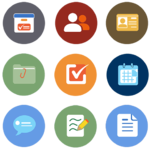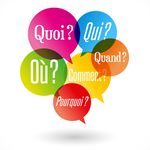Différences entre versions de « Authentic Assessment »
De Didaquest
Aller à la navigationAller à la recherche| Ligne 127 : | Ligne 127 : | ||
<!-- ****************** Commercez les modifications *********************** --> | <!-- ****************** Commercez les modifications *********************** --> | ||
| − | * Exemple 1: | + | * '''Exemple 1''': Portfolio |
| − | * Exeemple 2: Project | + | * '''Exeemple 2''': Project |
| − | * Exemple: Cmap | + | * '''Exemple 3''': Cmap |
| − | * Measure a wider range of skills and knowledge: Alternative assessments can measure a broader range of skills and knowledge than traditional assessments, which often focus primarily on content knowledge or memorization. Alternative assessments can also measure skills such as critical thinking, creativity, and problem-solving. | + | * '''Measure a wider range of skills and knowledge''': Alternative assessments can measure a broader range of skills and knowledge than traditional assessments, which often focus primarily on content knowledge or memorization. Alternative assessments can also measure skills such as critical thinking, creativity, and problem-solving. |
| − | * Encourage deeper learning: Alternative assessments can encourage students to engage in deeper learning by requiring them to apply their knowledge to real-world situations, solve problems, or create their own projects. | + | * '''Encourage deeper learning''': Alternative assessments can encourage students to engage in deeper learning by requiring them to apply their knowledge to real-world situations, solve problems, or create their own projects. |
| − | * Provide a more authentic measure of performance: Alternative assessments can provide a more authentic measure of performance than traditional assessments because they often simulate real-world situations or require students to complete tasks that are similar to those they will encounter in the future. | + | * '''Provide a more authentic measure of performance''': Alternative assessments can provide a more authentic measure of performance than traditional assessments because they often simulate real-world situations or require students to complete tasks that are similar to those they will encounter in the future. |
}}<!--************** Fin Fiche Didactique Explicitations ******************* --> | }}<!--************** Fin Fiche Didactique Explicitations ******************* --> | ||
Version du 13 mars 2023 à 21:12
 Traduction
Traduction
 Définition
Définition
Domaine, Discipline, Thématique
Définition écrite
- Alternative Assessment is a method of assessment that measures a student's level of competence in a subject rather than their level of progress. The overall goal of this type of assessment is to allow students to demonstrate their knowledge and perform tasks.
- Authentic assessment is a form of assessment that evaluates a student's learning and achievement in a real-world context, with tasks and activities that closely mimic the challenges and demands of the actual environment in which the knowledge and skills will be applied.
- Unlike traditional assessments, such as multiple-choice tests or standardized exams, authentic assessments typically involve performance-based tasks, observations, and student-produced work that require higher-order thinking, problem-solving, and creativity. Examples of authentic assessments include portfolio assessments, case studies, simulations, and project-based assessments.
- Authentic assessment is often seen as a more meaningful and effective approach to evaluation, as it allows educators to assess a student's ability to apply knowledge and skills in a practical setting, rather than just testing their ability to memorize and recall information. It also promotes deeper learning, as students are required to engage with the material in a more active and personalized way.
|
Définition graphique
 Concepts ou notions associés
Concepts ou notions associés
 Exemples, applications, utilisations
Exemples, applications, utilisations
|
 Erreurs ou confusions éventuelles
Erreurs ou confusions éventuelles
- One common misconception about authentic assessment is that it is subjective and cannot be standardized. However, authentic assessment can be standardized by establishing clear criteria for performance expectations and using rubrics or scoring guides to evaluate student work.
- Another misconception is that authentic assessments are not appropriate for assessing certain types of knowledge or skills, such as basic facts or procedural knowledge. However, authentic assessments can be designed to measure a wide range of knowledge and skills, including basic facts and procedural knowledge, as well as higher-order thinking skills such as critical thinking, problem-solving, and creativity.
![]() Confusion possible ou glissement de sens
Confusion possible ou glissement de sens
- Confusion entre ....... - ........
- Confusion entre ....... - ........
- ....................
 Questions possibles
Questions possibles
 Liaisons enseignements et programmes
Liaisons enseignements et programmes
Idées ou Réflexions liées à son enseignement
Aides et astuces
Education: Autres liens, sites ou portails
 Bibliographie
Bibliographie
Pour citer cette page: (Assessment)
ABROUGUI, M & al, 2023. Authentic Assessment. In Didaquest [en ligne]. <http:www.didaquest.org/wiki/Authentic_Assessment>, consulté le 5, décembre, 2024
- ..................
- ..................
- ..................
- ..................
Catégories :
- Sponsors Education
- Evaluation (Concepts)
- Assessment (Concepts)
- Pedagogy (Concepts)
- Psychology (Concepts)
- Educational Psycholgy (Concepts)
- Educational Sciences (Concepts)
- Non-traditionnel evaluation
- Portfolio
- Cmap
- Group test
- Authentic activities
- Continuous
- Contextualized test tasks
- Journals
- Concepts
- Authentic Assessment
- Authentic Assessment (Concepts)
- Fiche conceptuelle didactique





